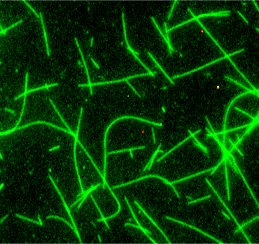Inhibitors of hepatocyte growth factor-stimulated epithelial scattering also inhibit tubulin polymerization
- By Cytoskeleton Inc. - Tubulin News
- Jul 18, 2016

 |
|
Microtubules assembled from HiLyte 488™ labeled tubulin (Cat. # TL488M). |
Recently, Hoj et al. further characterized compounds that were previously identified in a phenotypic, cell-based screen for inhibitors of hepatocyte growth factor (HGF)-mediated scattering of epithelial cells. HGF-induced epithelial cell scattering is an in vitro model to study the epithelial-mesenchymal transition (EMT), a key process in the sequential detachment, migration, and invasion of cancer cells at sites distal to the primary tumor. Thus, one potential class of anti-cancer compounds is HGF inhibitors or inhibitors of HGF-mediated signaling cascades. Here, a subset of the previously identified small-molecule compounds, those with no reported biological activity, were characterized across a variety of in vivo pharmacological and in vitro cellular and biochemical assays, including inhibition of tubulin polymerization using >99% pure tubulin to calculate maximal rates of polymerization and IC50 values for each compound. With >99% pure tubulin, inhibition was due to a direct interaction between tubulin and the compounds. Cytoskeleton's fluorescent tubulin polymerization assay kit (Cat. # BK011P) was an essential reagent in this study to not only calculate each compound's IC50 value, but also demonstrate that inhibition of tubulin polymerization is a key characteristic of compounds that also inhibit HGF-mediated epithelial cell scattering, a well-characterized and utilized in vitro model of EMT.
Link to citation:
Products used in this citation:
